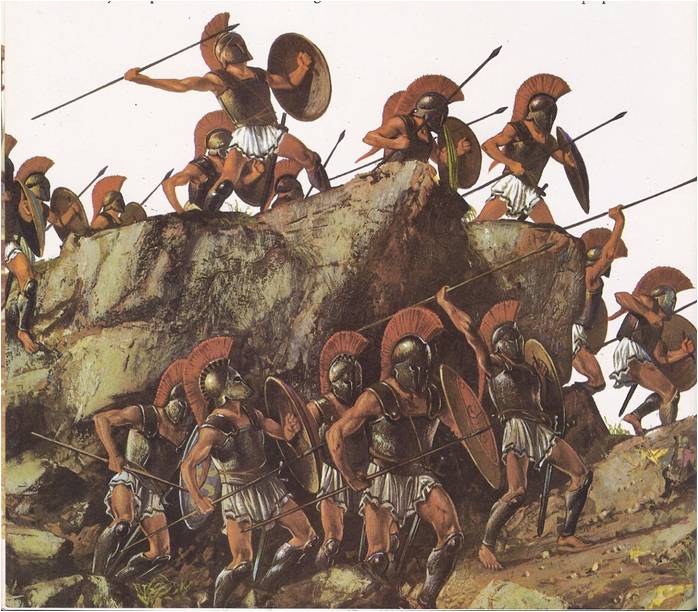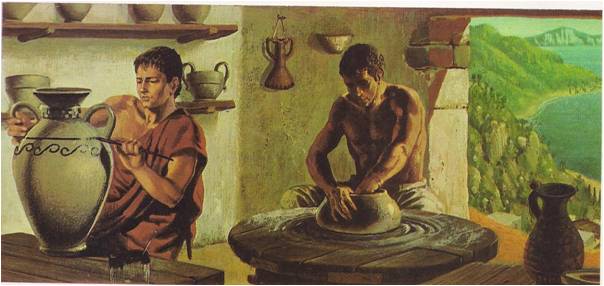In the last years of the fourth century B. C., Greek citizens going about their business in the stoas or the shops sometimes stopped and wondered what was wrong. Everything seems strange. They themselves had not changed and their cities looked the same as before, but the world around them was so different that they could hardly recognize themselves. The little poleis on the mainland looked out at an enormous empire, which stretched across Asia and Egypt. They shipped their olive oil and pottery across the Mediterranean. Their corn came from fields beside the Black Sea and the Nile. Merchants who crowded their market places now did business in Antioch and their sculptors had gone to Alexandria. There were new Greek cities, thousands of miles from Greece, where Asians spoke Greek and Greeks began to dress like the barbarians. There were no barbarians now, only the many sorts of people who shared a world which Alexandria had conquered for the Greeks. As the world the Greeks knew became larger, a man and his city seemed to become smaller. The Greeks began to wonder if there was a Greece at all any more. Athenians who travelled on business saw Athens in a new way when they came home. It was not very big and not very busy. When they went to the Assembly, the fine speeches had a hollow ring. In the old days, when Pericles or Themistocles spoke to the Assembly, things happened and the world felt the difference. Now, a man who spoke out in Athens might as well have dropped a pebble in an ocean. Alexander’s empire was much too big to be run by a group of citizens who talked over their problems in an Assembly. One man could rule it, if he was a king like …
Read More »The Greek Way of Life 700 B. C. – 343 B. C.
In the first years of Spartan peace, Greece was filled with wandering soldiers. Their little cities needed them no more. The new governments, which Spartans appointed, looked on them as men who might make trouble and were quick to get rid of them. Homeless and with no way to earn a living, the old campaigners roamed from place to place. They became soldiers of fortune, men who fought for any general or city that offered pay and three meals a day. In 401 B. C., ten thousand of them hired themselves out to Cyrus, a prince of Persia, who hoped to steal his brother’s throne. The Army of Ten Thousand was an odd lot. There were officers and men from a dozen or more Greek states, soldiers who had fought with and against each other during the thirty years of war that had torn Greece apart. Yet, under a foreign commander, they worked well together. They made a strong force which no Asian army could begin to match. Cyrus led them far into Persia and wherever they went they were victorious. Then Cyrus was killed in battle and the Greek officers were tricked and treacherously murdered. The great army suddenly found itself stranded, with neither money nor leaders. The men were not even sure where they were, except that it was hundreds of miles from the coast of Greece. Election of Xenophon The Persian king waited for them to lose heart and surrender, as any Asian army did when it had no officers to give it orders. The Army of Ten Thousand was Greek. After a day of confusion, the soldiers called an Assembly and elected a new general, Xenophon, a young Athenian who had been the assistant of one of the dead officers. For four months he led them …
Read More »Greek Against Greek 430 B. C. – 404 B. C.
About 425 B. C., a lonely man, in a country that was not his own, sat down to write the story of a war that had begun six years before. Thucydides, an Athenian, had fought in the war’s first battles. He had been a general, in command of thousands of his city’s troops. Then he was ordered to go to the aid of another commander whose men were outnumbered. When he arrived, the battle had already been fought and lost. It was not his fault but the people of Athens were too anxious about the war to consider that. They stripped Thucydides of his command and forced him to leave his homeland. Now, while the war raged on, he could only watch and he was troubled by the things he saw. Athens and its rival Sparta were caught in a deadly struggle to see which would be the master of the Greek world. Men died, cities were destroyed and nothing was gained, but the war went on. Thucydides began to write about the senseless fighting, hoping that he might teach the men of another time to avoid war. He wrote about the ambassadors from the city of Corinth, who spoke to the Spartans in their assembly, warning them about Athens. “You have no idea what kind of people these Athenians are”, the Corinthians said, “how altogether different from you. They are always thinking up new schemes and they are quick to make plans and to do something about them; but you are happy with what you have and slow to do even what is necessary. The Athenians are bold and adventurous; you Spartans are cautious and afraid to trust your own strength. They love foreign adventure, which you hate, because they think there is something to win, while you think …
Read More »Sparta: City of Soldiers B. C. 700 – 500
In Sparta, the shops in the market place had little gold or jewelry to sell and no fine furniture at all. The people in the streets were not well dressed. Even the temples, although big, were plain and there was little in Sparta to show that this was the strongest polis in Greece. Sparta was old fashioned and proud of it. The polis had begun as a kingdom and it stayed a kingdom. The only change its citizens made in more than 400 years was to have two kings instead of one. Each kept a watchful eye on the other and the one who was the better general took charge of the army. For a Spartan, that was progress enough. He did not like experiments. The system that modern Athens called “democracy” looked to him like bad organization and if there was one thing a Spartan wanted it was to keep things in order. His own days and years were run on a military schedule, because he was a soldier in the army. Each citizen of the polis was in the army. He started his training when he was seven and he remained a soldier until he was sixty. His orders came from his officers, the kings and the five ephors who managed the day-to-day affairs of the city. He obeyed orders and had no time for experimenting with newfangled ideas. In the early days, Sparta had been very much like Athens. By the seventh century B. C., when Athens was changing almost from day to day, the Spartans established their own way of doing things. As a matter of fact, they had no choice. Their ancestors, a fierce tribe of Dorian invaders, had taken the city from its old Achaean rulers. Using iron swords, they had quickly overrun the …
Read More »Athens: City of Wisdom and War 700 B. C. to 500 B. C.
Of all the city-states in Greece, Athens was the most fortunate. The city’s guardian was Athena, the goddess of war and wisdom. Indeed, the Athenians did well in war and were blessed with wisdom. In the dark days, when barbaric invaders had conquered one city after another, Athens had not surrendered. Later, when Athens felt the growing pains that brought civil war and ruin to so many city-states, a series of wise men guided Athenians safely through their troubles. The right leaders always seemed to come along at the right time. It was more than good luck, ofcourse. The Athenians put their trust in men with new ideas and they were willing to experiment. The experiments changed an ordinary little town into a great brilliant polis that left an enduring mark on the world. Athens was old. Its story began with a list of kings so ancient that no one was quite sure when they had lived. The greatest of them was Theseus, the young hero who killed the monster at Crete. The storytellers said that he won the friendship of the neighbouring tribesmen and persuaded their chiefs to swear loyalty to his city. That was the beginning of the polis, but many years passed before it became important. In the seventh century B. C., Athens was only a second-rate, backwoods polis. Its king could do little more than dream of the glorious old days when their forefathers had defended the town’s acropolis – the Athenians called it the Rock – against the barbarians. Attica, the countryside around the old fortress on the Rock, was really ruled by a quarrelsome lot of rival noblemen, the chiefs of the clans. These barons ran their vast estates like private kingdoms. They owned the country villages and all but owned the people in …
Read More »Kings, Tyrants and Democracy 1000 B. C. to 100 B. C.
During the Dark Ages, the large kingdoms of Homer’s Achaean heroes had disappeared. The Greek world was now dotted with dozens of little countries. They had begun with fortresses set on hills and crags. Soon each fortress was surrounded by a village, as farmers abandoned their huts in the fields and built new homes close to the walls. In times of danger, they could take refuge behind the walls. A market place was built and a few metalsmiths and potters opened shops. When temples were set up inside the fortress, the castle hill became an acropolis, a “high town,” the sacred centre of a kingdom as well as a place to hide from attackers. The village chief began to call himself a king. The New Noblemen In a kingdom not much bigger than a town, everyone could keep an eye on the king and his friends, the noblemen. The people watched their rulers carefully, for life in Greece was changing and not always for the better. Food was scarce and there was meat only on holidays. The rest of the year, the people ate mostly barley porridge and sometimes fruit and olives. Even wheat was expensive and no one had any money. The little kingdoms did not have enough olive trees to make them rich. Besides, the groves belonged to the noblemen, who never shared their profits. These new noblemen were not knights. They managed the kingdom’s business, like a town council and they kept a tight hold on their land but when it came to war, they were perfectly willing to give everyone a share in the fighting. Noblemen no longer rode to battle in chariots and fought in single combat. Battles were now fought by long lines of men who formed a deadly wall of swords and shields. …
Read More »





